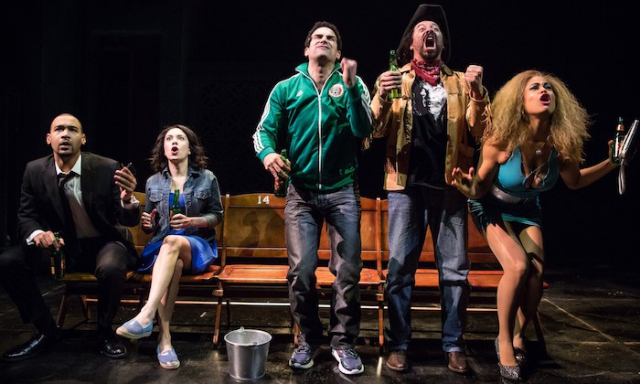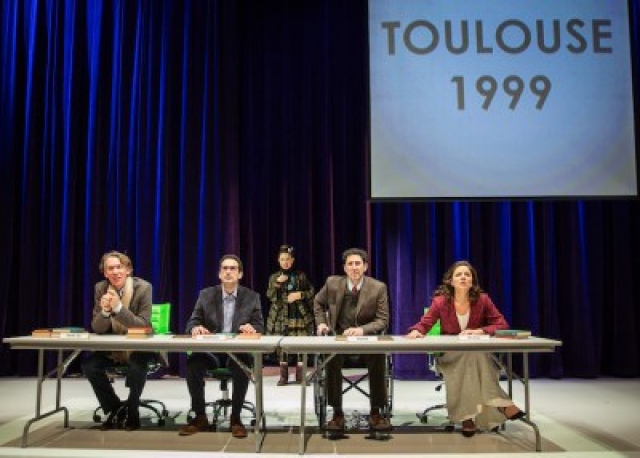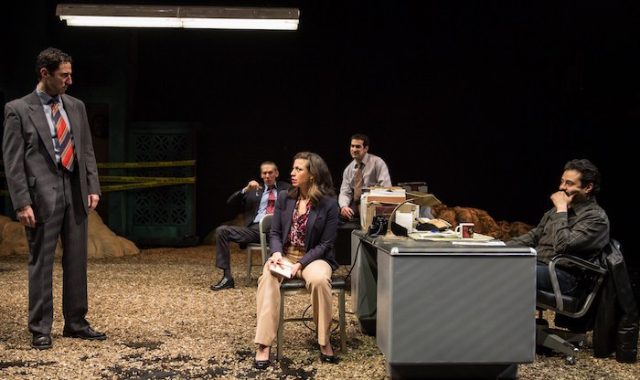2666 at Chicago's Goodman Theatre
Adapted from Roberto Bolaño's Massive Novel
By: Nancy Bishop - Feb 22, 2016
The Goodman Theatre’s new production of 2666, adapted from the massive novel by the late Roberto Bolaño, takes five stories and threads them loosely together with a couple of mysteries that keep us wondering until the end. And the end is five-and-a-half hours after we first sit down in the Goodman’s Owen Theatre.
Each segment of 2666 is distinctive in subject matter, locale, era and staging, even though the same actors appear in different guises. Robert Falls and Seth Bockley collaborate on both the script adaptation and directing. The result is excellent acting by an all-Chicago cast of 15 actors playing 80 characters, with creative staging and timing that is usually crisp but sometimes drags. Goodman brings off a stupendous display of theatrical hubris, backed by generous funding from a lottery winner. (Of that, more later.)
Does it all work? One of my colleagues, a 3CR music writer, called the new Kanye West album, The Life of Pablo, a “beautiful mess.” And with apologies also to Jason Mraz for his song of that name, that’s the best way to describe 2666: It’s a beautiful mess.
It’s beautiful, gorgeously staged and costumed. It makes fine use of projections for scenic and historical background and backstory and even presents a movie-within-the-play during one segment. The key actors—and almost all of the 15 are key actors—do a superb job of portraying the array of characters, moods and events throughout the evening.
Falls and Bockley approach the work by creating a single act from each section of Bolaño’s book. Each part is gripping in its own way. But the five parts—and their resolved and unresolved mysteries—don’t quite hold together as a single work of art. It’s wildly creative, as is Bolaño’s novel, but a bit of a mess.
I was tempted to review 2666 as a compilation of plays, something like Neil LaBute’s Vices and Virtues, being performed now at Profiles Theatre. But those 11 dramas (which you can see in one day or in two visits) are each distinct and unrelated, whereas threads connect all five of the 2666 stories. One of them is the writing and career of a mysterious German author with the sort-of-Italian name, Benno von Archimboldi.
In Part One, The Part About the Academics, four scholars of German literature and of the author Archimboldi meet at European academic conferences to discuss arcane aspects of his work, puzzle about his whereabouts, and eventually carry on love affairs. The setting for Part One is minimalist with two conference tables and lime green swivel chairs that serve many purposes. We follow the conference locales and topics on a large projection screen. Sean Fortunato, Lawrence Grimm, Demetrios Troy and Nicole Wiesner play the four scholars. The script is smart and witty and larded with academic satire.
In Part Two, The Part About Amalfitano, we meet Professor Amalfitano (Henry Godinez) and his teenaged daughter Rosa (Alejandra Escalante), who live in Santa Teresa, Mexico. Rosa worries her father because she goes out to clubs too often. Santa Teresa is the scene of a series of violent crimes against young women—rape, mutilation and death—that is based on historical fact. Santa Teresa is the pseudonymous Ciudad Juarez, where a serial killer or killers began a rampage of feminicidios (Spanish for female homicides) in 1992 that has ebbed and flowed but continued until recently.
In Part Three, The Part About Fate, a Harlem journalist, Oscar Fate (Eric Lynch), is assigned to cover a boxing match in Santa Teresa and discovers the story about the feminicides, which he wants to pursue. Some of Part Three is shown on film as Oscar meets Rosa Amalfitano and her friends as they party, attend the boxing match and party some more.
Part Four, The Part About the Crimes, is like a police procedural set in a Santa Teresa police station where the cops process the feminicides, make sexist jokes, drink on duty and generally behave badly. The adaptation takes a documentary approach, bringing on three women in turn to report on the names, ages and suffering of the female victims. This section is a bit repetitive and could stand some judicious trimming.
Part Five, The Part About Archimboldi, is set in Berlin as the Nazi era begins. Some pieces from the past and future come together and the Archimboldi mystery is solved.
It must have been a challenge to adapt Bolaño’s five-part novel to the stage. Falls and Bockley do so with careful attention to the structure of the original work. They could have reconceived the work and turned it into a more coherent single story with a much shorter running time. Part One, the Part About the Academics, might have gone by the wayside (and that would be a shame). The structure they chose has a sense of madness and tragedy that builds through the five acts.
2666 is a play for those who are mad—mad about theater, storytelling and the magic of live performance. It’s not for casual theatergoers.
Some of my favorite examples of very long-form theater include the Hypocrites’ All Our Tragic, Elevator Repair Service’s Gatz and Tom Stoppard’s The Coast of Utopia. As Mark Lawson commented in the Guardian a few years ago on the subject of longform theater, “Length sells, as long as the measurements are extreme.”
Goodman presents 2666 with three intermissions of 15 or 20 minutes. This gives you time to stretch and walk around, eat a cookie and sip some caffeine. Each section runs 65 to 75 minutes. During intermission, a curtain with 2666 in giant numerals comes down to allow the stage crew to create a completely different setting for the next act.
Scenic designer Walt Spangler and stage managers Joseph Drummond and Alden Vasquez get major props for their work in designing and staging five completely different sets, each with its own projection design scheme by Shawn Sagady. The filmed segment of Part Three is inventive and enables us to see scenes that could not have easily been staged, but the film was an unnecessary element. Richard Woodbury and Mikhail Fiksel handled original music and sound design.
The Roy Cockrum Foundation is the principal funder for 2666. You’ll see that name again because Cockrum is also funding Steppenwolf’s 2016 production of the new Tracy Letts play, Mary Page Marlowe. Cockrum is a Northwestern University theater alum, who became a monk and later won the Powerball Lottery. His foundation is dedicated to helping nonprofit theaters “reach beyond their normal scope of activities and undertake ambitious and creative productions.”
The Goodman Theatre, 170 N. Dearborn, has extended 2666 through March 20. Performances are Tuesday-Saturday at 6:30pm and Sunday at 1pm. Tickets are $20-45 with $10 student tickets available for any performance (valid student ID required). Buy tickets online, at the box office or by calling 312-443-3800.
Reposted courtesy of Nancy Bishop and Third Coast Review.




